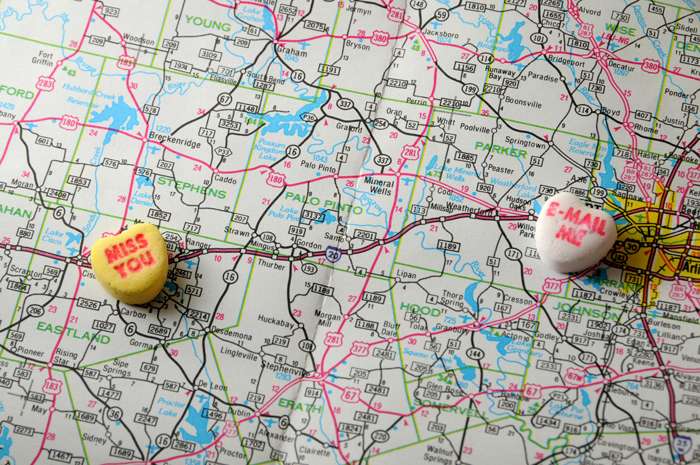The College Mirage: Helping your freshman navigate the first year
/Last year at about this time of year a student came to see me. She was a new freshman and, a week or two into her shiny, sparkly college life she was feeling neither shiny or sparkly. While she was loving college in general, in some ways things weren't working out the way she had expected--her roommate wasn't her soul sister, there weren't endless dates, her class load required a lot more work than she had needed to do in high school, and she was still figuring out how to find her way in this new place. In some ways, the shiny sparkly college life felt like a mirage--one that had been the promised land all through high school and one that all of her friends on social media seemed to inhabit.
photo via
I've been thinking a lot about college transition and freshman loneliness ever since--as a professor who studies & teaches human development, as an advisor to freshmen students, and as a mom to three college-age students.
We tend to prepare our children for college like getting in is the hard part, the finish line. After lavishing all that energy and attention on those entrance exams, applications, GPA maintenance, extracurriculars, no wonder they internalize the message that once you receive that acceptance letter, you've made it! Everything else will fall into place! Books, tv, movies, social media all highlight and glorify the golden glow of the college years. But, like most things in life, the reality often doesn't live up to the hype.
Meanwhile, if they want to, new freshmen can manage to keep up the image that the hype lives on, curating photos and posts and emoji-adorned texts to downplay the real emotions and loneliness (or even depression and anxiety) that might be happening beyond the tiny phone screen.
Just at the point when parents begin to acclimate to their child's absence in the home, across the miles for many freshmen students, the orientation parties and excitement of meeting all these new people wears off. The reality of the academic workload sets in and some students manage this better than others. Some sail through pretty well but many don't want to disappoint their families that their grades are lower than they've grown used to getting in high school or that they still haven't found their tribe.
Last year, Cornell freshman Emery Burgmann created this video about her college transition for a class assignment on transformation. It's a funny, poignant window into the freshman transition ("I feel like this friendship-hungry gremlin...") and the Youtube comments on this clip attest to how common these feelings are:
We parents are pretty good at prepping our kids' dorm rooms and outfitting them with the school supplies they'll need. Just as important (arguably more so), having family conversations leading up to the college launch can ease everyone's social/emotional acclimation to this huge milestone. We can paint a realistic view of what this next level of study and life will look like rather than glorifying (or trying to live vicariously). In the months and years leading up to the transition to college, try to have open conversations that are sparked by questions like these:
- What kind of living/dorm situation will open you up to connecting with others (single occupancy rooms might seem ideal but they can also lead to isolation)?
- What will you/can you do when you're lonely (because everyone feels lonely sometimes, especially during transitions)?
- What if you get overwhelmed with the workload?
- What resources are available on campus for talking to a trustworthy, informed adult?
- How will we stay connected so you can share your good times but also your struggles?
- What are the signs you can watch for to check on your emotional wellbeing and mental health?
- Did you know you can drop a class? Or withdraw from one, even, if things get overwhelming?
- How will you let me know if you are really really struggling (some families even have a family signal word that means "help!")?
- How will you navigate roommate differences and disagreements?
- What activities can balance out your schedule or provide an outlet for stress, anxiety?
If you're the parent of a college student right now:
- emphasize that friends are made gradually and it's completely normal to feel at sea during a big transition. It often takes years to find your "tribe."
- just listen, hear, and validate the emotions. You don't need to solve the problems, just be a guide through them. Share your own hard experiences and how you navigated them (but first just listen listen listen).
- make time to Skype/Facetime/Marco Polo and talk on the phone. Texts are marvelous for check-ins and logistics but can be misleading, minimize, or mask real emotions. If possible build in a set time each week to really connect.
Interested in reading more? Check out:
- The Real Campus Scourge by Frank Bruni (New York Times). Emily references this article in the video above; it's the article her mom sent her.
- What Made Maddy Run (by Kate Fagan), a heart breaking and eye opening book looking into the death by suicide of U Penn star athlete Maddy Halloran. For a shorter peek, try this NPR story and this podcast with author Kate Fagan's insights and takeaway messages.
- Practicing mindfulness has been linked to healthy college transition. Another study here.
- Great tips here for college students, including keep your door open and spend as little time as possible in your room--hang out in common areas and study in the library.
What do you wish you knew when you started college? What helped with the transition? What didn't?


















